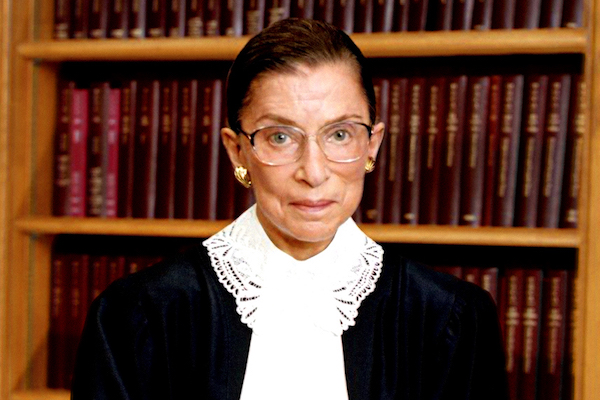Weeks away from the end of a four-year onslaught of attacks on women and LGBTQ people, we heard about the most pro-LGBTQ and pro-women justice to ever serve on the U.S. Supreme Court had died on September 18 at the age of 87.
Ruth Bader Ginsburg started in the law field when it was much more difficult for women to advance and be taken seriously. In 1970, she co-founded the first women’s rights law journal in the U.S., co-founded the Women’s Rights Project at the ACLU in 1972, and was one of a handful of first female law professors in the country.
She served on the Supreme Court for 27 years, siding with the pro-LGBTQ side in 13 out of 15 cases, including three rulings that led to national recognition of marriage equality. In 2003, she was part of the majority that struck down anti-sodomy laws in the United States.
For women, she voted in 1996 to strike down a male-only admissions policy and in 2007 for equal pay. She was the second woman to ever serve on the Supreme Court and from 2006 to 2009 she was the only woman serving on it.

Decades of major progressive rulings coupled with her personality brought Ginsburg icon status. She eventually took on the nickname RBG, a play on the late rapper Notorious B.I.G.
She was the first Supreme Court justice to officiate a same-sex wedding, and did so two years before the court’s historic 2015 decisions. Her image graces LGBTQ pride face masks, phone cases, and T-shirts.
Kevin Jennings, CEO of Lambda Legal, says she was a “long-standing ally of the LGBTQ community” and called her an “irreplaceable giant.”
Megan Rapinoe, Janet Mock, Laverne Cox, Billie Jean King, and other LGBTQ women tweeted condolences after her passing in September, mostly thanking her for her service. Pete Buttigieg called her a “titan of justice.”
For Ginsburg, working against sexism, homophobia, biphobia, and transphobia were connected. Some of the sex discrimination cases she worked on in the 20th century ended up becoming precedents allowing LGBTQ rights in the 21st century. This connection culminated in the 2020 Supreme Court Bostock v. Clayton County, Georgia decision that stated Title VII applied to LGBTQ workers, which brought non- discrimination protections to our community at long last. “Title VII [was] meant to strike out the entire spectrum of sex discrimination,” Ginsburg declared.
It’s both fitting and telling that large rainbow flags flew at the makeshift memorial for Ginsburg on the steps of the Supreme Court building in Washington in the hours and days following her passing. She may not have been a member of the LGBTQ community, but she was a good friend who will be deeply missed.


